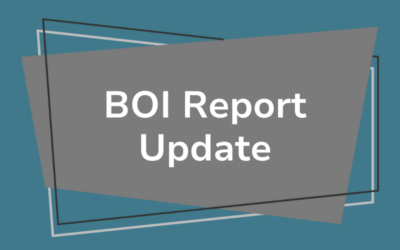Running a business and staying up to date with LLC compliance can be a bit overwhelming for many entrepreneurs. There are a lot legal requirements at the federal, state, and local level to track and take action on throughout the year. And to make matters worse, the requirements can vary depending on where the company is located, the industry, its business activities, whether it has employees, and other factors.
As we venture into the last few weeks of the year, I’d like to provide a recap of the primary LLC compliance items you need to be aware of, and most likely, take action on before year-end. Here’s a list of some filings, reports, and other tasks an LLC may need to complete to stay compliant at the federal, state, and local levels.
Federal Compliance for LLCs
Filing and Paying Federal Taxes
The federal taxes an LLC might be responsible for include:
- Federal income tax
- Self-employment taxes (Social Security and Medicare)
- Federal payroll taxes – e.g., withholding federal income tax and FICA from employees’ pay and remitting those funds to the IRS and federal unemployment tax (FUTA)
Renewing Federal Licenses
An LLC engaged in certain activities in specific industries must obtain and maintain federal licenses or permits to conduct business legally.
Examples of federal licenses include:
- Agriculture – e.g., the import or interstate transport of animals, animal products, plants, plant products, soil, genetically engineered organisms, and timber
- Alcohol – e.g., the import, export, or wholesale sale of alcohol
- Broadcasting – e.g., broadcasts via radio, television, satellite, and cable
- Aviation – e.g., aircraft operation, transport of people and cargo, aircraft maintenance, etc.
Updating Beneficial Ownership Information Report
If any information about the LLC or its beneficial owners has changed since the company filed its Beneficial Ownership Information Report (BOIR) with the Financial Crimes Enforcement Network (FinCEN), it must issue an updated report within 30 days of the change(s). The penalties are especially steep for non-compliance with the Corporate Transparency Act’s Beneficial Ownership Reporting Rule, so I can’t stress enough how important it is to report changes within the timeframe required!
State LLC Compliance Requirements
Filing Annual Reports
Many states require LLCs to file annual reports to ensure the information on record about the company is up to date. The due dates for annual reports and the information required vary from state to state.
Generally, annual reports request:
- The LLC’s name
- Principal office address
- Purpose of the business
- Federal tax ID number (EIN) and the state tax identification number
- LLC members’ and managers’ names and addresses
- Registered agent’s name and address
- DBAs (doing business as names, a.k.a. fictitious names or trade names), if applicable
Renewing State Licenses
Depending on the business activities the LLC engages in, the company or its members may need to obtain and renew certain state business licenses and permits.
Examples of state license renewals include:
- Liquor license
- Agricultural licenses
- Environmental project permits
- Childcare facility license
- Home improvement contractor license
- Sales tax license
- Professional licenses (such as cosmetology, massage therapy, the practice of medicine, and real estate)
Maintaining a Registered Agent
An LLC must designate and maintain a registered agent in the state. A registered agent (also known as a statutory agent or resident agent) is an individual or company the LLC members authorize to receive legal correspondence and other official notices and documentation on the LLC’s behalf.
The types of documents registered agents receive for the LLC may include:
- Federal and state government correspondence
- Subpoenas for information
- Court summonses
- Tax notices from the IRS and other tax authorities
- Lawsuit notices
- Wage garnishment notices
Filing and Paying State Taxes
The types of tax filings and payments an LLC might be responsible for at the state level include:
- State Income tax
- Franchise tax
- Gross receipts
- Sales tax
- State payroll taxes – e.g., withholding state income tax from employees’ pay and remitting those funds to the state and state unemployment tax (SUTA).
Following the LLC Operating Agreement
While an LLC doesn’t have to file its operating agreement with the state, it must maintain it in its business records and follow its terms and conditions. An LLC operating agreement governs how the business entity should be run. Some of the processes and procedures it establishes and members must comply with include rules for:
- Holding member meetings and recording minutes
- Dividing profits and losses among LLC members
- Resolving disputes among the LLC members
- Issuing, selling, or transferring ownership interests
Filing Articles of Amendment
LLCs that have undergone fundamental changes must file Articles of Amendment to notify the state. While the form looks different depending on the state, most cover the following types of changes:
- Company name
- Company business address
- Change in Registered Agent information
- Member information
- Types of business activities the LLC conducts
Keeping Personal and Business Finances Separate
It’s critical for LLC members to maintain separation between their personal finances and their company’s funds and transactions. If the business owners pay for personal purchases with the LLC’s money (or vice versa), it could result in piercing the corporate veil. That’s when a court disregards the LLC as a separate legal entity from its members, which puts the owners’ personal assets at risk of being used to pay off business debts.
Local LLC Compliance Responsibilities
Filing and Paying Local Taxes
Some counties and cities levy taxes on LLCs. Examples include:
- Local income tax
- Local payroll taxes – e.g., withholding local income tax from employees’ pay and remitting those funds to the local tax authority
- Local sales tax
Renewing Local Licenses and Permits
An LLC may need to obtain and maintain licenses at the local level to conduct its business activities. The requirements vary depending on the county or municipality.
Examples of local business licenses and permits include:
- Zoning permit
- Local sales tax license
- Health permit
- Fire permit
- Home-occupation permit
- Retail food license
- Food truck permit
- Building permit
- Sign permit
The Risks of Non-Compliance
If an LLC doesn’t comply with state, federal, and local rules, it could face serious consequences, which include:
- Fines
- Loss of access to the court system for bringing suit against others
- Loss of liability protection, resulting in the business owner’s personal assets becoming fair game to satisfy business debts
- Loss of preferred tax treatment (e.g., involuntary revocation of S Corporation status)
- Tax liens
- Loss of legal authority to conduct business activities
- Administrative dissolution of the LLC by the state
- Difficulty obtaining loans or other funding
- Reputation damage
Any of the above issues could be devastating for a business, so it’s well worth your time and attention to keep track of your compliance task deadlines and submit your reports, tax returns, and fees on time.
Use CorpNet’s Free Compliance Portal to Keep Track of Your LLC’s Compliance Tasks
Save time and avoid the hassle of jumping from one frustrating government website to another to find the information you need and locate the applications you must complete. Our secure portal gives you what you need in one place!





